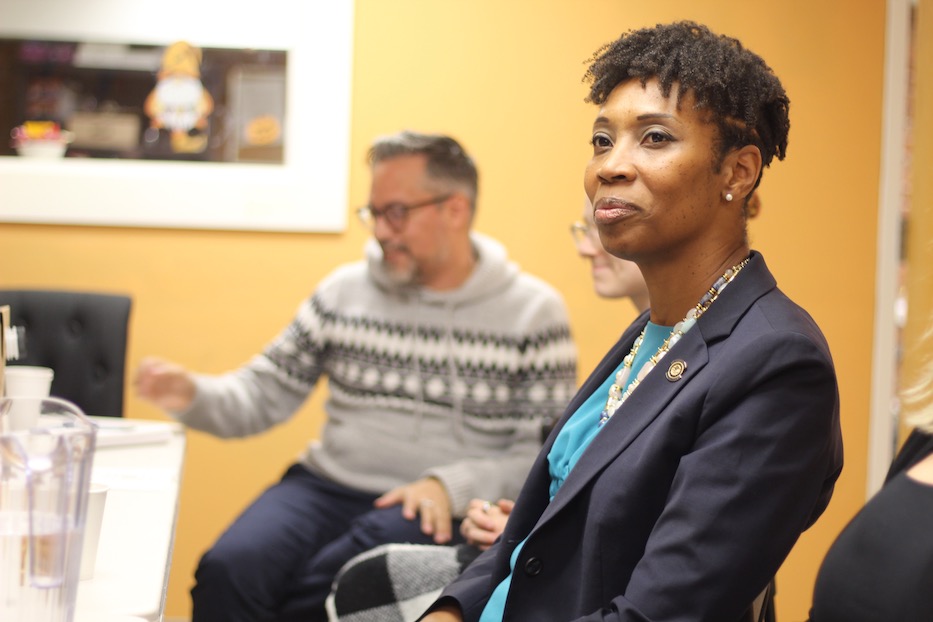
Culture & Community | LGBTQ | Politics | New Haven Pride Center
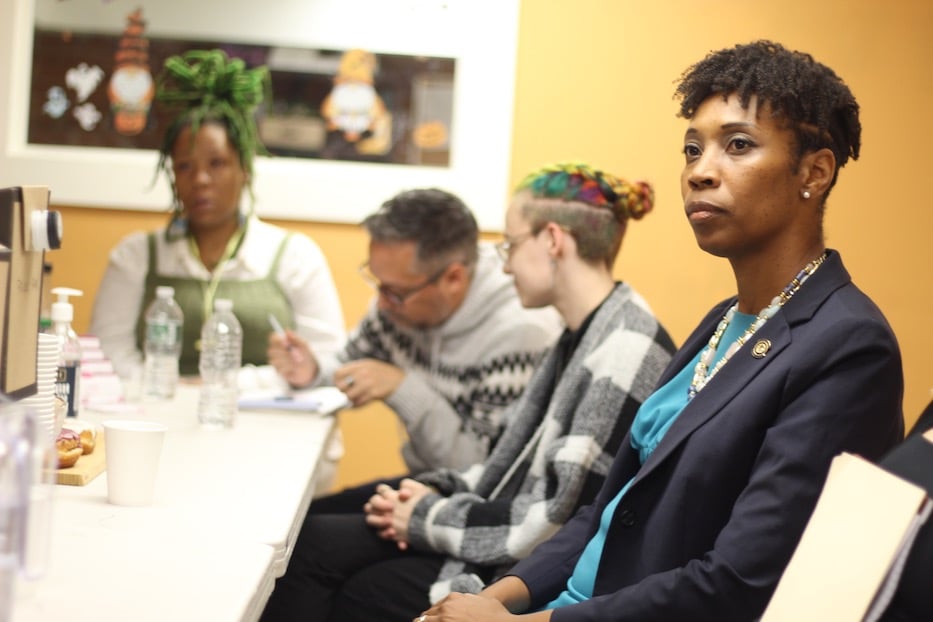
U.S. Attorney Vanessa Avery. In the background, from left to right, are Director of Youth Services Ala Ochumare, Deputy Director Juancarlos Soto, and Marketing and Development Manager Laura Boccadoro. Lucy Gellman Photos.
Can a new federal prosecutor overcome years of mistrust in law enforcement from New Haven’s queer community? Can she do it as anti-LGBTQ hate and rhetoric rise across the state?
That question sat at the center of an hour-long, at times contentious and emotional conversation at the New Haven Pride Center (NHPC) Monday afternoon, as Center leadership and staff met with U.S. Attorney Vanessa Avery and members of the New Haven U.S. District Attorney's Office. By the end of the hour, it had cracked something open, revealing decades of trauma that may stand between experiencing or witnessing a hate crime and feeling confident enough in law enforcement to report it to police.
Avery, who grew up in New Haven's Newhallville neighborhood, was nominated to the position earlier this year by U.S. President Joe Biden. Now, she and staff are working to rebuild trust with community groups who have not always historically worked with law enforcement—often because they have been victimized by it. In her role, Avery supervises 68 attorneys across the state who prosecute both criminal and civil cases brought by the federal government.
"I am excited to be in the role, and to think about how we can be better in the community," she said early in the meeting, as members of the office introduced themselves in the Orange Street center's Great Room Gallery. A riff on Frog and Toad from the illustrator Riley Samuels seemed to wink out from the wall, waiting to hear what she had to say next.
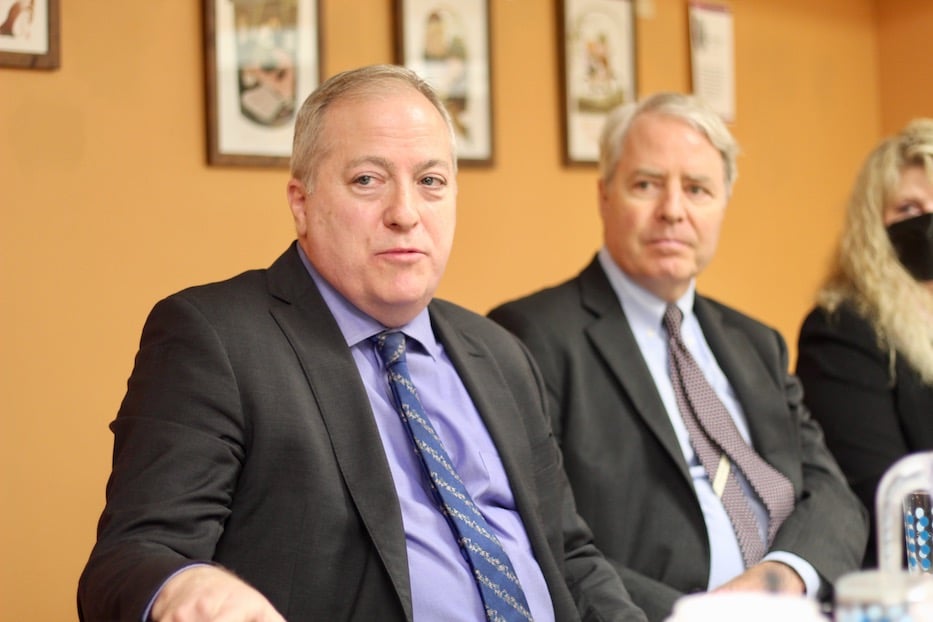
David Health, who works with the national affinity group DOJ Pride to boost LGBTQ+ initiatives at the U.S. Department of Justice. DOJ Pride Honored Dunn with the Gerald B. Roemer Award award last year. Lucy Gellman Photo.
Avery and her team were at the Pride Center on Monday specifically to promote United Against Hate, a new nationwide initiative from the U.S. Department of Justice to address and stem hate crimes across the country. In the New Haven office, that effort is helmed by Assistant U.S. Attorneys Anastasia King and Bill Brown.
In particular, Avery and her colleagues are working to encourage people from historically oppressed and marginalized groups—gay people, transgender people, Black and Brown people, religious minorities, women, disabled people, and people who stand at many of those intersections—to report a hate crime to local law enforcement, sometimes the first step in what becomes a federal investigation. For many of those groups, law enforcement has been a historical foe rather than a friend.
"In my experience working with law enforcement, good things will only happen if we communicate," said Hal Chen, an assistant U.S. attorney who serves as the office's director of community engagement. "If an incident happens, someone has to react."
“Think About What You’re Asking This Community To Do”
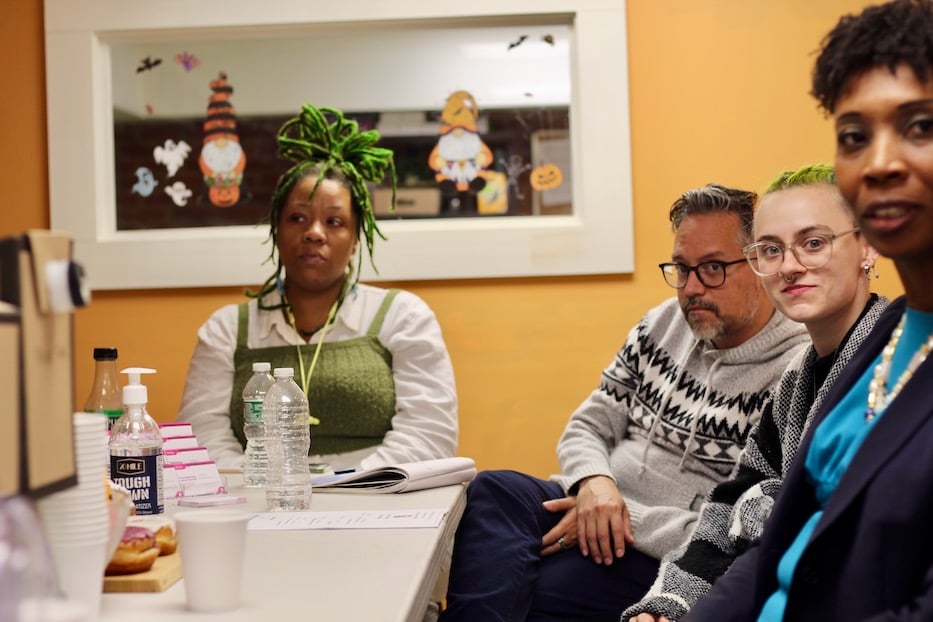
Ala Ochumare: "You divested from us. You criminalized us ... how are you actually going to repair relationships with the community?"
From the beginning of the conversation, a tension crackled through the air.
For centuries, NHPC Executive Director Patrick Dunn acknowledged, local, state and federal law enforcement officials have failed to protect the queer community—from raids on gay bars and anti-sodomy laws to bathroom bills, unsolved murder cases, and the police killings and disproportionate incarceration of LGBTQ+ people and particularly Black trans women.
Since the beginning of his tenure at the New Haven Pride Center in 2017, he's watched as New Haven cops have been accused of repeatedly raping sex workers, used pepper spray on nonviolent protesters, physically abused their spouses and partners, and engaged in violent misconduct that most recently left New Havener Randy Cox paralyzed. In other words, he said after the meeting, he doesn't have reason to trust the New Haven Police Department.
And yet, "we've unfortunately had situations that have had us needing to engage [with law enforcement]," he said Monday. Most recently, he and Center staff have been on high alert as a new far-right, anti-trans Super PAC moves into Fairfield County and a Connecticut chapter of The Proud Boys continues to expand in the state. They've received hand-written hate mail and anonymous phone calls that subscribe to the false, conspiratorial "groomer" narrative being pushed by hate groups online.
The Center has more recently had to deal with cyber crimes, including the online doxxing of two community members that could have cost them their lives.
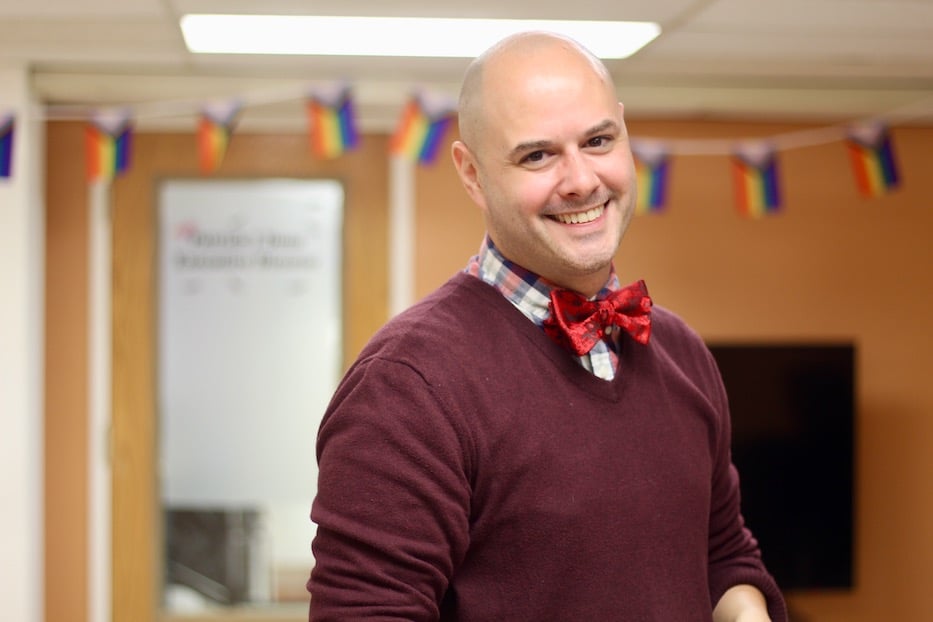
Patrick Dunn.
"We want to know about critical threats," Avery said, adding that local law enforcement is still often the first step. "Our job is to make sure that everybody here feels safe."
Center Director of Youth Services Ala Ochumare pushed back. A co-founder of Black Lives Matter New Haven, Ochumare has spent decades of her life watching as friends, fellow organizers, and family members are harassed by the police. For years, she has been at the forefront of action decrying state-sanctioned violence, from the murders of Alton Sterling and Philando Castile to the police killings of George Floyd and Breonna Taylor in 2020.
In her work and her life, she said she thinks constantly about the Black women who are murdered without proper investigations into their deaths, including Connecticut resident Lauren Fields.
"Oftentimes when we hear 'queer,' we think 'white,'" she said. "But for me as a nonbinary femme presenting Black woman, I think about how all that you're saying totally ... it's very hollow. Truly, think about what you're asking this community to do to work for you."
She spoke of family members in the city's Hill neighborhood who were terrorized by police. She pointed to a group of violent cops who became known as "The Beat Down Posse," noting that she was struggling to stay in the conversation with Reentry and Community Outreach Coordinator Holly Wasilewski at the table.
For just over two decades, Wasilewski was a member of the New Haven Police Department, including a stint as District Manager in the Hill from 2007 to 2015.
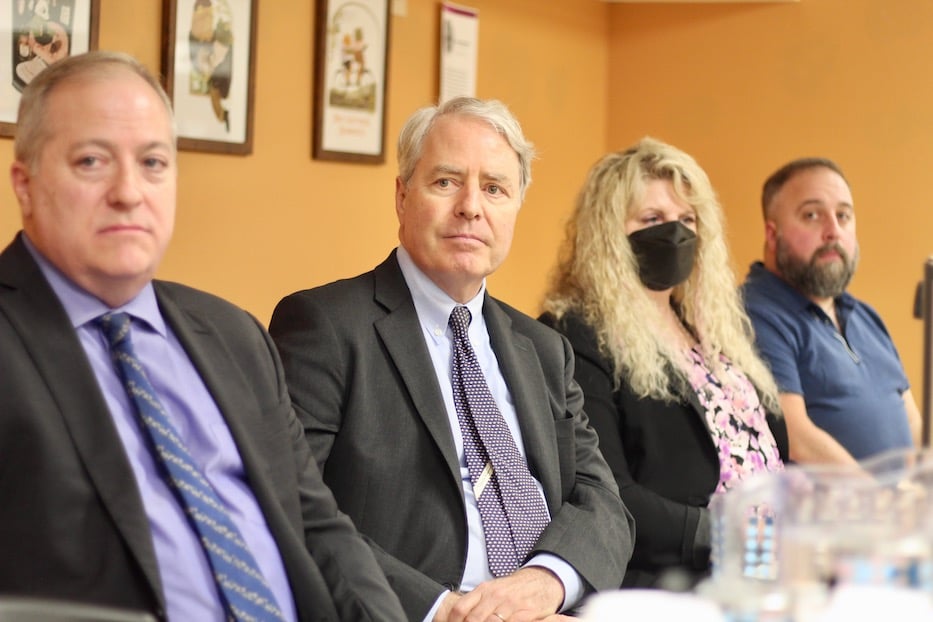
It was a reminder to everyone in the room of the visceral hurt that can last generations when officers abuse their power and when police-community relations collapse.
"I can't sit here and listen in this meeting any longer without grounding us," Ochumare said, turning to Wasilewski. "You divested from us. You criminalized us ... how are you actually going to repair relationships with the community?"
“It was how you treated adults who had addictions," Ochumare later added, when Wasilewski insisted that she had not been violent, and pointed to a record of positive interactions in the Hill documented in the New Haven Independent. Instead of connecting people with treatment options, Ochumare saw the cops respond with physical violence for years.
In her voice was frustration with not one officer, but an institution that has for over 400 years failed to protect those who may need protection most, and in many cases hurt those people in the process.
The room was silent for a moment. Coffee cooled in to-go cups and heavy cardboard carriers. A quartet of frosted pastries sat untouched on the table.
Then Avery responded.
She acknowledged the pain that she heard in Ochumare's voice. "I do think that what you may have experienced, that doesn't have to be the permanent status," she said.
"Who do y'all'' work for?" Ochumare asked. She later left the table after asking for, and not receiving, an apology for the harm that the NHPD caused her family.
"We don't look at it as an ‘us’ and a ‘them,’" said Avery, who earlier had noted that the role is nonpartisan, and that she has worked in the office through the last four U.S. presidential administrations. "We are government. All of us around this table."
"A Very High Level Of Distrust"
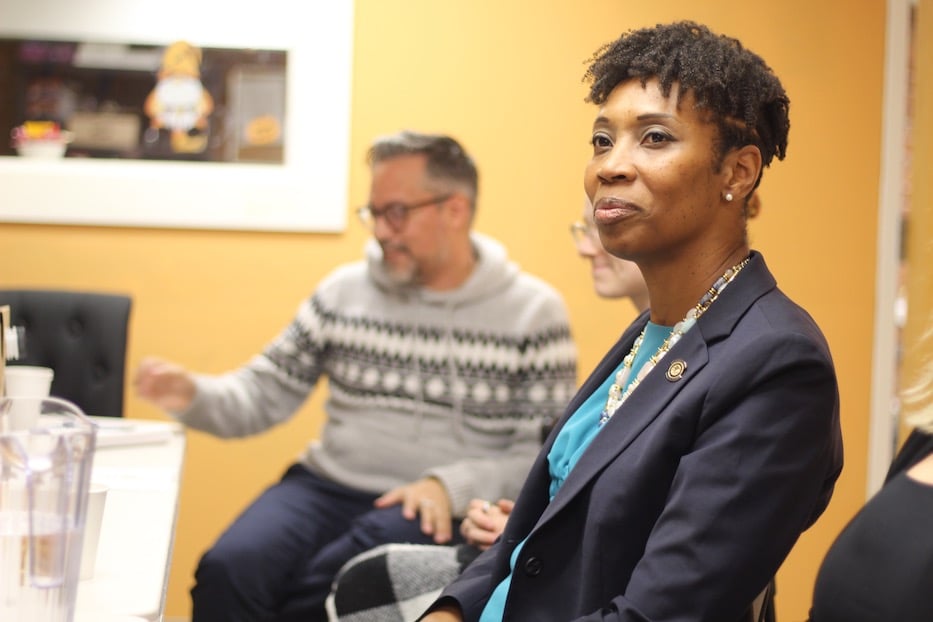
One by one, Center staff discussed threats and intimidation that they have received, from hand-written hate mail to people who call and accuse them of indoctrination. After jobs at both Junta for Progressive Action and Planned Parenthood of Southern New England, Deputy Director Juancarlos Soto said his mother is still most fearful of him going to work at the Pride Center each day. Dunn, who is no stranger to anti-LGBTQ hate, said he rarely reports incidents to police because he doesn’t trust the force.
“I think there is a very high level of distrust,” he said. While the U.S. Attorney’s Office is technically a nonpartisan outfit, that’s been especially true in the last four to five years, as he and others have watched the precipitous and violent erosion of LGBTQ+ rights across the country. Azula Luz, who grew up in New Haven and joined the Center’s staff after her summer internship, nodded along in agreement. She later noted the imbalance of power that she felt in the room: law enforcement officials can pull her over, arrest her, or knock on her door at any hour of the night.
Avery suggested cultural sensitivity training for police departments, something that the DOJ seeks to do in improving relations between law enforcement officials and the community members that they ostensibly serve.
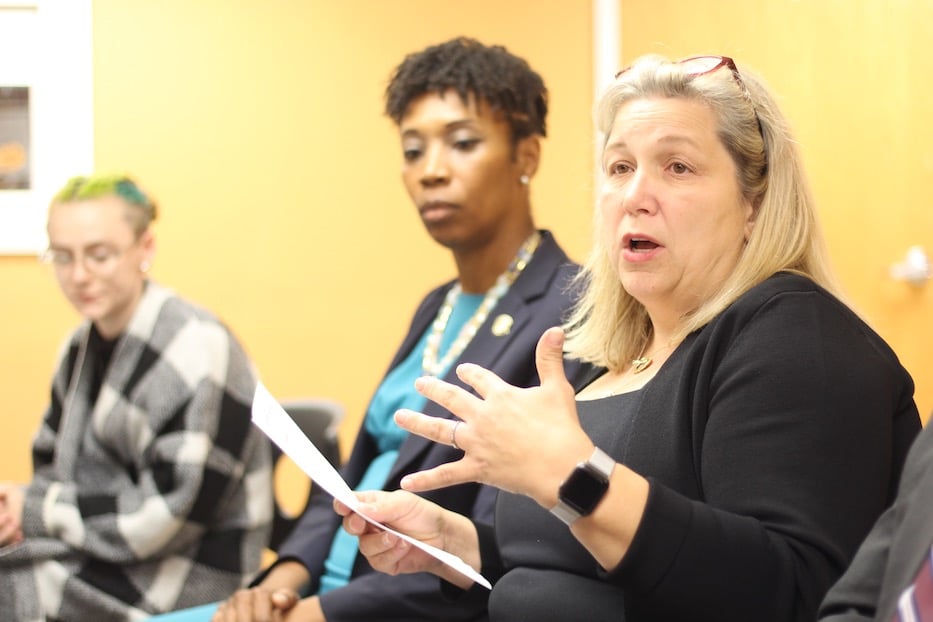
Anastasia King.
In an interview with the Arts Paper after the discussion, Avery added that she does still hope and intend to build trust with the Center and its staff, including a potential “United Against Hate” discussion. “It’s flexible,” she said. “We’re ripping and ready to go.” King added that the office would be happy to host a second conversation specifically about the program, which teaches community members to identify hate speech and incidents, at the NHPC’s request.
Soto, who listened for most of the hour, thanked Avery and members of the U.S. Attorney’s Office for coming. He reminded them that it was a beginning in what needed to be a long-term exercise in trust building.
"I knew that the potential existed for tensions to run high," he said, urging attendees to sit in the discomfort of the moment. "This is about trust. And if it's about trust, it's gonna get messy in the beginning—"
"And hurt sometimes," Dunn added.
"And hurt sometimes!" Soto continued. "And sometimes for healing, you have to expose the wound."
“I think if we can take a risk on each other, then there’s an opportunity there,” Chen said. “I can’t promise anything. But I can promise if we do nothing, nothing will happen.”
In an interview after the discussion, Dunn agreed that it marked a beginning, and that he still felt guarded. He noted that "every person here wants to see our community feel safe," which felt like a start—even if that safety meant something different for every person in the room.
"As an organization, we are responsible to the community," he said. "We are not responsible to anybody else. Before the next step, there has to be a consensus ... we have to move from a space where we can move forward."

